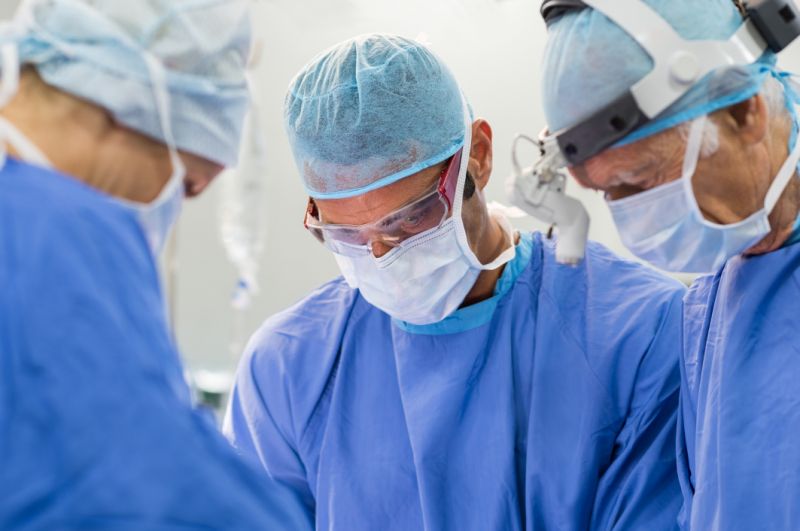
The world’s population is getting older. What does that mean for healthcare investors?
To get a handle on what healthcare stocks Fools favor right now, we asked a group of investors to weigh in and they called out Intuitive Surgical (NASDAQ: ISRG) Abiomed (NASDAQ: ABMD), and Teva Pharmaceutical (NYSE: TEVA).
This market leader is on sale
Todd Campbell (Intuitive Surgical): There were 1 million surgeries done last year using Intuitive Surgical’s robotic assist system, da Vinci, and growing use in new procedures, such as hernia repair, suggest da Vinci will win more widespread use in 2019.
Recently, the company unveiled first-quarter financials that were shy of Wall Street’s projections. However, the numbers weren’t nearly as bad as the big drop in its share price indicates, and that could mean investors have an opportunity to buy this market leader on sale.
After reporting earnings per share that were $0.09 shy of expectations, shares tumbled 7%, bringing its month-to-date decline to over 13%, as of this writing. However, first-quarter sales were up a healthy 15% year over year to $974 million, and adjusted earnings per share of $2.61 were still up a respectable 7% from one year ago.
That earnings grew slower than sales might have contributed to the sell-off in shares, but investors should take a long view, because the dip in earnings came from new financing arrangements that allowed more hospitals to purchase da Vinci systems. In Q1, da Vinci placements surged 27%, suggesting solid tailwinds to future demand for the consumables the system uses every time a surgery is performed.
There are over 5,100 da Vinci systems installed worldwide, up 13% from this time last year, and procedure volume is up 18% in the past year because of increased use in general surgery. A larger installed base and increasing use resulted in a 20% increase in instrument and accessory revenue to $552 million last quarter.
Because Intuitive Surgical has over $5 billion in cash and equivalents, no debt, and a runway to consistent double-digit growth because of more installed systems, the sell-off could make this a great time to add this stock to portfolios.
A fallen angel
Brian Feroldi (Abiomed): I’ve been a fan of Abiomed for quite some time. The medical-device maker holds a near-monopoly in the growing field of temporary heart pumps and has grown at a phenomenal rate over the past few years. That has translated into breathtaking financial results and big returns for shareholders.
What’s going to continue fueling Abiomed’s growth? Here are the opportunities that continue to draw my attention:
- The company’s market share in the U.S. is still in the low teens. That means there’s ample room left for growth in Abiomed’s home turf.
- Abiomed is spending lavishly to win new approvals for its family of heart pumps. Two indications that hold enormous promise are ST-elevation myocardial infarction and nonischemic heart failure. Success with these indications could greatly expand the company’s current addressable market.
- International expansion is still in its infancy. The company is currently ramping up in Germany and Japan, but it also has already secured regulatory approval in India, China, Israel, France, and the UK.
When these opportunities are combined, I believe Abiomed could remain in hypergrowth mode for many years to come.
As for the stock, Abiomed’s shares have come under some serious selling pressure. The stock is down than 35% from its all-time high set more than a year ago, which isn’t terribly surprising when considering this company almost always trades at a nosebleed valuation. While shares are still not “cheap” — Abiomed is currently trading around 54 times next year’s earnings estimates — I think this company still has plenty of gas left in the tank and that the premium is easily justified.
A generic medication maker that’s returning to its strength
Chuck Saletta (Teva Pharmaceutical): Despite being one of the largest generic-drug makers on the planet, Teva Pharmaceutical was thrown for a loop when the patents on its own blockbuster drug, Copaxone, started to expire. The company was forced to slash jobs, eliminate its dividend, and report a net loss in 2018 at least partially because of the related restructuring.
Despite all that bad news, there’s reason to believe that now may be a great time to consider investing in TEVA Pharmaceutical’s shares. First and foremost, thanks to its restructuring efforts, the company is expected to earn around $2.40 per share in 2019 and $2.62 in 2020. At a recent market price around $14.57 per share, that’s around six times estimated 2019 earnings and an even smaller multiple of estimated 2020 earnings.
Even if the company only delivers at half the earnings that analysts are expecting from it, it’s still priced at a reasonable level. And should the company’s recovery take even longer than anticipated, Teva Pharmaceutical sported around $1.8 billion in cash on its balance sheet as of December 2018. That can go a long way toward helping it both with its near-term debt maturities and with any remaining hangover from its restructuring efforts.
Teva Pharmaceutical is priced like damaged goods — a reputation it has deserved in recent years. With its recovery looking as if it finally has a decent chance of taking hold, however, that reputation has a legitimate chance of changing for the better. That makes now a great time to consider investing before the market sees irrefutable proof that a recovery has taken hold.





























